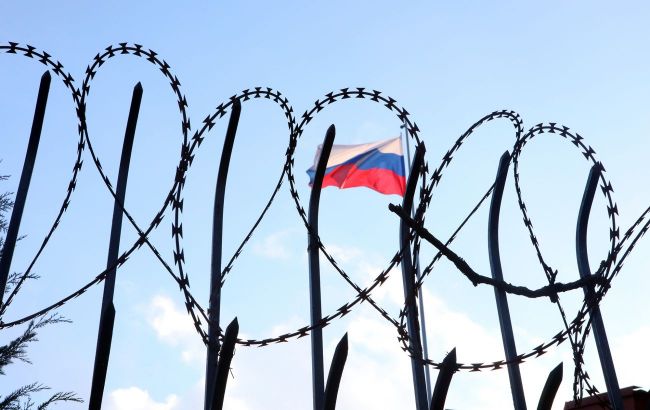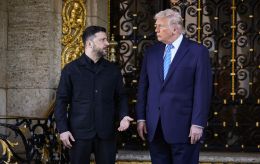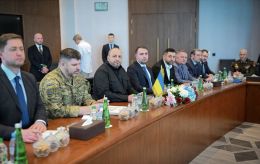EU adopts 12th sanctions package against Russia: Trade restrictions aggressor country face
 Sanctions against Russia will hit the aggressor's economy (Getty Images)
Sanctions against Russia will hit the aggressor's economy (Getty Images)
The European Union has adopted another, the 12th package of sanctions against Russia. It strengthens the existing restrictions and controls over their compliance. In addition, additional restrictions are imposed on individuals, companies, and certain industries.
Read more about the new package of EU sanctions against Russia and what effect they may have on the economy of the aggressor country in the RBC-Ukraine article below.
The new package of sanctions includes Belarusian and Russian military officials, defense companies, and private military companies. Additional restrictions will take effect on January 1, 2024. Among the innovations is a ban on imports of Russian diamonds and liquefied natural gas to the European Union.
Taboo on Russian diamonds
The need for a ban on diamond imports to the EU has been discussed for over a year. Belgium, home to the world's largest center for the trade and processing of these precious stones, was against it.
In October, Belgian Prime Minister Alexander de Kroo announced his readiness to limit the import of diamonds. However, the embargo will be introduced in stages - from January 1, March 1, and then from September 1, 2024. Imports of rough diamonds, jewelry, and processed stones from third countries will be restricted.
However, the loss of the European market will be slightly noticeable for Russia in the context of total exports, which amount to about $590 billion. However, it will seriously blow the industry, as the EU accounts for almost half of Russian diamond exports.
In addition, Russia has already stated that diamond supplies may be reoriented to other countries, particularly India. This has already happened with oil: after the EU and G7 imposed a ban on oil imports from Russia in 2023, Russian oil supplies to China, India, and Türkiye increased significantly.
Liquefied natural gas (not) for Poland. What does Ukraine have to do with it?
Restrictions on Russian liquefied petroleum gas (LNG) will be introduced during a one-year transition period. Its supplies to the EU are also small - $1 billion a year with a share of the EU market of up to 6%.
Poland is the main buyer of Russian LNG. By the way, Ukraine also buys LNG from Poland. "The Poles will be the most affected by the European embargo. "Sibur (Russia's largest petrochemical holding - ed.) is the main supplier of LNG to Poland," the A-95 consulting group notes.
"The Poles will have to look for new ways to supply more than three thousand tons of gas daily. And, of course, its cost will increase. Given that Ukraine buys most of its liquefied natural gas from Poland, prices will change in Ukraine as well. Latvia and Lithuania, where Ukraine also buys gas, are active consumers of Russian LNG.
"Our market is very tightly integrated into the European market, so we will not be spared from the changes. If the embargo is fully implemented quickly, the main effect will be a price increase. In 2023, Russian gas in Poland was cheaper than offshore gas by USD 150-250 or UAH 9/l. Thanks to solid parallel earnings on Russian gas, Polish traders could sell us purely European gas a little cheaper than we would have bought it ourselves. After the sanctions are imposed, the price tag will be purely European," says Artem Kuyun, an expert at A-95.
He emphasizes that it will be possible to finally assess the situation and make a forecast after the sanctions are imposed.
Do sanctions affect cunning Russia?
The economic effect of the new restrictions will be so great as to significantly limit Russia's military capabilities. In addition, the new package does not provide for sufficiently serious measures to limit the circumvention of the sanctions already in place.
After the restrictions were imposed in 2022, the Russian Federation is finding new markets - China, Türkiye, Armenia, and Central Asian countries have significantly increased their imports from Russia during this period.
Doctor of Economics, Professor Oleksii Plotnikov, positively assesses the new sanctions package and hopes that each new package will not only introduce new sanctions but also strengthen the existing ones.
"We hope that with the 12th package, the European Commission will not stop the development of sanctions policy and that in the next packages, the mechanisms for circumventing sanctions will be adjusted. And perhaps the sanctions will be extended to countries that facilitate their circumvention," he says in a commentary to RBC-Ukraine.
The new sanctions package also considered some of Ukraine's recommendations, Vladyslav Vlasiuk, advisor to the head of the Presidential Office, tells the agency.
He notes that the new package tightened restrictions on financial markets, introduced restrictions on the work of Russians in companies dealing with cryptocurrencies, and made it more difficult for Russians to open companies in the EU to cooperate with Russia.
EU sanctions against Russia
On December 18, the European Union introduced a new 12th package of sanctions against Russia. According to the head of European diplomacy, Josep Borrell, the bloc proposed "a powerful set of new lists and economic measures that will further weaken the Russian military machine."
The sanctions package includes restrictive measures on the import or transportation of Russian diamonds, import and export controls and restrictions, oil, iron, and steel price caps, and a significant number of individuals and entities were added to the list.

